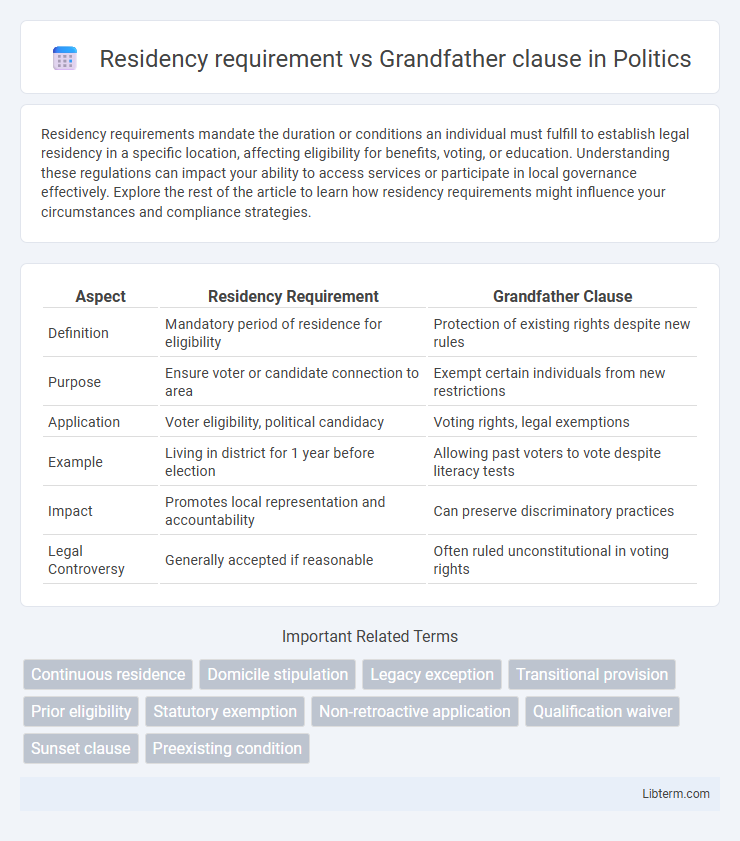Residency requirements mandate the duration or conditions an individual must fulfill to establish legal residency in a specific location, affecting eligibility for benefits, voting, or education. Understanding these regulations can impact your ability to access services or participate in local governance effectively. Explore the rest of the article to learn how residency requirements might influence your circumstances and compliance strategies.
Table of Comparison
| Aspect | Residency Requirement | Grandfather Clause |
|---|---|---|
| Definition | Mandatory period of residence for eligibility | Protection of existing rights despite new rules |
| Purpose | Ensure voter or candidate connection to area | Exempt certain individuals from new restrictions |
| Application | Voter eligibility, political candidacy | Voting rights, legal exemptions |
| Example | Living in district for 1 year before election | Allowing past voters to vote despite literacy tests |
| Impact | Promotes local representation and accountability | Can preserve discriminatory practices |
| Legal Controversy | Generally accepted if reasonable | Often ruled unconstitutional in voting rights |
Understanding Residency Requirements
Residency requirements mandate that individuals live within a specific jurisdiction for a designated period before qualifying for certain rights or benefits, such as voting or tuition rates. The grandfather clause exempts individuals who were already established before new residency rules were enacted, allowing them to retain privileges without meeting updated criteria. Understanding these distinctions is essential for navigating legal eligibility and compliance in areas like housing, education, and employment.
What Is a Grandfather Clause?
A grandfather clause is a legal provision allowing existing conditions, rights, or regulations to continue despite new laws or requirements, such as residency mandates, being implemented. It exempts individuals or entities already meeting previous standards from complying with updated rules, preserving their status or privileges. This clause ensures that those affected by changes are protected from immediate impacts, maintaining fairness and continuity.
Key Differences Between Residency Requirements and Grandfather Clauses
Residency requirements mandate that individuals must live within a specific geographic area to qualify for certain rights or benefits, ensuring current local engagement and compliance with property or legal regulations. Grandfather clauses exempt existing individuals or entities from new rules or restrictions, preserving previously granted rights despite changes in law or policy. The key difference lies in residency requirements imposing ongoing conditions based on current residence, whereas grandfather clauses offer protection based on historical status, providing continuity for pre-existing members.
Historical Background of Residency Requirements
Residency requirements originated in the early colonial period as a means to ensure political stability and allegiance to local governance, often tied to land ownership and community commitment. These requirements typically mandated a minimum period of residence before individuals could vote or hold public office, reflecting a desire to prevent transient populations from influencing local decisions. The grandfather clause arose as a legal mechanism to exempt certain groups, often preserving voting rights for those who met prior qualifications, thus impacting the enforcement and evolution of residency requirements throughout history.
Origins of the Grandfather Clause
The origins of the Grandfather Clause trace back to late 19th-century Southern United States legislation designed to circumvent residency requirements and voting rights for African Americans. This legal provision exempted individuals from new voting restrictions if their ancestors had the right to vote before the Civil War, effectively disenfranchising Black citizens while maintaining existing privileges for white voters. The clause contrasts with residency requirements, which mandate a minimum period of residence but do not rely on ancestral qualifications or historical exemptions.
How Residency Requirements Affect Eligibility
Residency requirements restrict eligibility for certain benefits, voting, or licenses based on an individual's duration of residence within a specific jurisdiction. These rules often exclude recent movers, ensuring that only established residents participate in local governance or receive services, reinforcing community stability and resource allocation. The grandfather clause can exempt individuals who met previous criteria before the implementation of new residency rules, preserving their eligibility despite changes in regulations.
Legal Impacts of the Grandfather Clause
The grandfather clause exempts individuals or entities from new residency requirements, preserving existing rights or privileges established before the law's enactment. This legal construct mitigates retroactive application issues and protects vested interests, preventing potential challenges based on constitutional principles such as equal protection. Consequently, the grandfather clause ensures smoother legal transitions by balancing regulatory changes with established legal statuses.
Case Studies: Residency Requirement vs Grandfather Clause
Case studies on residency requirements versus grandfather clauses reveal complex legal interpretations impacting voting rights and property regulations. In *Harper v. Virginia Board of Elections* (1966), residency requirements were scrutinized to prevent discriminatory practices, while grandfather clauses were historically invalidated for disenfranchising African American voters following *Guinn v. United States* (1915). Modern analyses emphasize balancing state interest in residency enforcement with protections against unconstitutional grandfather clauses that perpetuate bias or unequal treatment.
Modern Applications and Challenges
Residency requirements often mandate physical presence or established domicile to access benefits or rights, creating challenges for transient populations and digital nomads in modern contexts. Grandfather clauses allow existing conditions or rights to persist despite new regulations, complicating legal consistency and enforcement as jurisdictions update residency standards. Balancing fair access with evolving residency rules demands nuanced policy design to address mobility trends and legacy rights without undermining current legal frameworks.
Policy Considerations and Future Trends
Residency requirements often mandate that individuals maintain physical presence within a jurisdiction to qualify for specific rights or benefits, impacting voter eligibility and access to social services. Grandfather clauses exempt existing individuals or entities from new regulations, preserving previous rights and preventing abrupt disruptions in established practices. Future policy trends indicate a shift towards balancing stringent residency enforcement with inclusive grandfather protections to ensure equity while adapting to increased population mobility and changing legal landscapes.
Residency requirement Infographic

 libterm.com
libterm.com